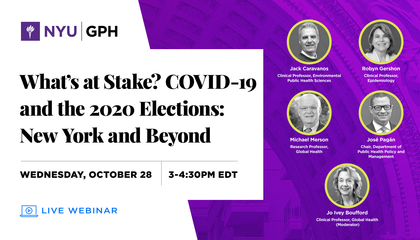GPH hosted a webinar that aired in the days leading up to the 2020 U.S. elections, and as the pandemic emerged as a pivotal issue for voters. The discussion focused on the public health and government responses to COVID-19 in the past, present, and future, in New York City and the United States as a whole.
The discussion was moderated by Dr. Jo Ivey Boufford, clinical professor of global health and included: Dr. Jack Caravanos, clinical professor of environmental public health sciences; Dr. Robyn Gershon clinical professor of epidemiology; Dr. Michael Merson, research professor of global health; and Dr. José Pagán, chair of the department of public health policy and management.
Boufford began by discussing the importance of COVID-19 in the context of the approaching national elections in the United States. She also identified several key lessons learned so far from the COVID-19 pandemic, such as the exposure of the profound health disparities on the basis of race and socioeconomic status, the need for greater cooperation between the health and government sectors, and the importance of focusing on cities for global and national public health.
Merson then contextualized the conversation with a report on the current global and national landscape of COVID-19 cases, hospitalizations, and deaths. He also noted several key factors that led to successful responses in certain countries, and reaffirmed the importance of multilateral collaboration and commitments to global health from the United States.
Next, Pagán discussed the past and current landscapes of COVID-19 within New York City. He noted the challenges and key elements of the public health and government responses to the pandemic, and the approach that New York City has used to conduct testing and tracing of cases. Finally, Pagán highlighted the impacts of the segmented health care delivery system in the United States and how that has influenced the response to health threats such as COVID-19.
Gershon then provided an overview of essential workers and COVID-19 in the context of disasters and how they have been historically managed. She also discussed her recent pilot study on the impact of COVID-19 on the physical and mental health of NYC transit workers and affirmed the importance of keeping science at the forefront of all disaster management.
Finally, Caravanos shared his perspective on the complexity of applying public health interventions to various public venues in order to effectively control the spread of COVID-19. He discussed the various levels of risk depending on the venue and the activity, and noted that some interventions merely make people feel safer instead of actually reducing risk. He also described his recent work with rideshare companies, and the process of reopening Broadway in New York City.
Follow-up questions from the audience included how to increase trust in public health systems and how to provide appropriate health and risk communication to the public; the most effective way to approach screening and contact tracing; and the role that public health students can play now and in the future to ensure a healthier, more equitable society.
Boufford concluded by reaffirming the importance of voting in the 2020 election and in remaining civically engaged to foster a more just and equitable country.
